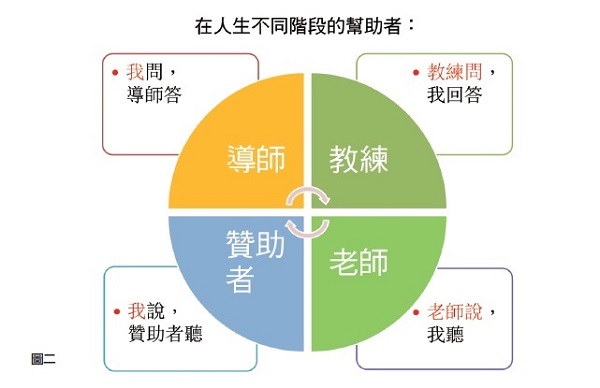Growing Together in Love
[Mobility in Heaven—Parents and Children] Series 5
Organized/Linda Pang
Have you ever heard parents helplessly complain about their adult children: "You don't ask me when you make decisions, so you can't control them anymore", or "You don't want to listen to what I say, and you can't control them anymore"? Have you ever heard a married child sigh in frustration: "Why don't you respect my choice?" or "What I need is blessing, not criticism."
When children no longer need “nurturing” from their parents, how can parents and children maintain a close relationship? Even if the children grow up and start a family, whether the children are at home or away from home, are the parents still willing to use trust as the basis of the relationship, communicate heart to heart, and continue to discover, receive, and share love? Whether it’s the distance between two places, the distance between cultures and lifestyles, or the distance in views on things... there must be a distance between the two generations. But distance does not necessarily become a barrier to the parent-child relationship. When parents manage their relationship with love, their children can leave home and return home with peace of mind. No matter how old their children are, parents and children can still be together and grow together in love.

▲ When parents manage their relationship with love, they can still partner with their adult children and grow together in love.
Integrity; richness; maturity
"Children today don't know what hardship is!" I believe many parents have either thought about it or said this.Indeed, compared to the previous two generations, our children and their children may grow up in a relatively wealthy and stable environment. But this does not mean that they have not endured hardship. It may just be that generations have different definitions of "suffering".
The parents' generation experienced limitations such as limited financial resources and an environment that did not allow them to use their talents, which made people feel depressed. The younger generation may not lack tangible resources, but in a society with chaotic values, it is not easy to recognize the truth clearly, and it is even more challenging to maintain faith. This is their burden now.
Parents may think that a high degree of education is about finding a good job with high salary, good benefits, and stable promotion, preferably in a well-known large company. This is the "glory". Unexpectedly, young people enter the workplace right after graduating from college. They don’t think that a master’s degree or a doctorate is necessary. They work for one or two years and then quit their jobs to travel before they have saved much money. Either they get married without saving or buying a house, or they are unwilling to get married even though they are older than they are young, or they have children at a young age, or they are 40 years old and still don’t have children...
When there are differences between two generations in their attitudes toward work, life, and even service, the older generation is also asked to listen more instead of criticizing, and to empathize more than judge. Parents are always worried that their children will endure hardship and take the wrong path, but who can guarantee that what parents think is best will really be the best for their children? How does God view children and what talents has he given them? As parents, are we willing to seek it together with our children?
I would like to encourage parents in three words: Integrity;Abundance;Maturity. The abbreviation of the three words is IAM; Jehovah declares that He is the God who exists from eternity, which is I AM. The attitude towards life represented by these three words can help parents better deal with their adult children in life. (Picture 1)
1. Integrity
I hope parents can honestly examine themselves before God and themselves: Are the suggestions or requests I make for my children for him or for myself? Are my values about money, employment, and marital relationships biblical? If the child does not accept our advice, is he justified? If children are an "inheritance" given by God, are my methods and attitudes "management" or "control"?
Have you ever heard or seen parents deliberately create situations or say things that are similar to emotional blackmail, in order to make their children care more about them? Or are you unwilling to admit your mistakes for self-righteous opinions, self-made decisions, or overreactions without understanding the situation?
The God we believe in is faithful and righteous. As long as we admit our mistakes and repent, we will be forgiven and accepted.It may not be easy for parents to let go of their inherent dignity, but admitting their mistakes and apologizing to their children is an important step in maintaining a harmonious relationship.When children make mistakes and ask for forgiveness, they hope that their parents will treat them kindly. By getting along with your children in this way, I believe your relationship will become increasingly open and real.
2. Rich
If we live in Christ, we will view the resources we have as abundant and feel peaceful and secure in our hearts. This is an abundance mentality. On the contrary, a poverty mentality often focuses on the lack of resources and is prone to anxiety and insecurity. Resources do not only refer to property and status, but also to opportunities, character, and expertise.
Regarding tangible or intangible resources, Chinese parents may be accustomed to the traditional virtue of "preparing for a rainy day" and often worry that their children will fall behind others. Indeed, Proverbs uses the example of ants to commend preparations that “prepare food in the summer and gather food in the harvest.” However, planning is to manage and make good use of resources, not to cause people to worry, because the blessings given by the Lord make people rich and do not add worries. If you fall into a poverty mentality, you will focus on the limited resources, worry that if others have it, you will lose it, worry about gains and losses, and put pressure on yourself and your children.
From time to time, I hear that parents do not approve of their children’s chosen majors or interests they want to develop, and are worried that they will not be able to support themselves. If parents can maintain an abundance mentality, as mentioned in the 71st article in this series, they will be able to encourage their adult children and inspire them to find their passion. When they discover the meaning of their lives and live out their calling from above, they believe that God will provide what they need because God promises:“Whoever seeks the Lord will lack no good thing,” and “whoever trusts in Him will not be put to shame.”
3. Maturity
Growing older does not necessarily mean becoming more mature. With a "growth mindset", our lives will become more and more mature. Do I feel that now that my children have grown up and have a family, can I still "grow" myself? certainly! As a parent, your hair has turned gray, so you still need to “grow up”?Having a growth mindset and being a lifelong learner can make your life rich and exciting. Not only can you learn knowledge, but you can also expand your horizons and update your ideas.
Growth means change, and change comes with a price.Many times we know the benefits of change, but are afraid of the price. Little do we know that not changing often requires paying a greater price. So, how do parents and children put into action the changes they know they should make?
Many people believe that in order to change, you must first know the benefits of change in your mind and think about how to change. This is the process of "analyze → think → change". Harvard University professor John Kotter proposed,The act of change starts from the heart; first see the result of a change, be moved, feel envious, and encourage yourself to be willing to change. This process is "see → feel → change".
I would like to encourage parents who want to see changes in their children's lives to change themselves first, so that their children can see the results of the changes, feel envy, feel the benefits of the changes, and let their inner desires drive the behavior of change. In this way, parents and children become partners who grow together.
Zero sum or win-win?
People of the older generation like to say: "I eat more salt than you eat rice", which means that young people should respect and accept their own suggestions because they have much more experience and experience than young people. However, Pastor Liu Zijun from Taiwan said: "The salt you eat is different from the rice I eat." This means that the two generations have different experiences, experiences, perspectives and characteristics. He also suggested that we should not only see and accept differences, but also use each other's differences as blessings to each other.
Can parents and children also get along with this attitude? It is no longer about who listens to whom, but about working together to help each other; it is no longer about fighting over "who has the final say", but about thinking together about "how to benefit both parties", and ultimately putting themselves in the hands of God to make love God's people benefit. Parents appreciate their children's strengths, and children respect their parents' advice.At this time, parents are like the child's "patron", believing in his potential, helping him develop his talents, and supporting him with tangible and intangible resources, helping his children instead of controlling them.(Figure II)

French painter Paul Cézanne was a late bloomer, and the rising talent painter Picasso had already emerged, and he had not yet entered the art palace of Paris. However, Louis-Auguste, who has provided financial support to him since he was young, and Ambrose Vollard, who held his first solo exhibition for the 56-year-old, are both loyal fans of the master. They affirmed his talent with practical actions and are his sponsors. . Not only did the artist himself finally get a stage to shine, but you and I in future generations were also able to appreciate these works of art.
As parents, our companionship in childhood, encouragement in adolescence, and respect in adulthood allow us to give more recognition to our children who have begun to develop steadily in their own lives and professional fields.
As a parent, although I know that I shouldn’t force my children to become a dragon or a phoenix, I still hope that they will become successful. Whether it is due to choice or circumstance, if a child's life and professional development are not as expected by his parents, do we still lament that "iron cannot be transformed into steel"? My children are now grown up, but nagging and blaming them doesn’t work and hurts my feelings. I say I don’t care but I still care deeply. What should I do?
Maybe we can look at ourselves and our children in a different light. If parents are gardeners, their duty is to water and weed on time, ensure there is sufficient sunlight and nutrients, so that the flowers, plants and trees they cultivate can display prosperity and vitality according to the characteristics created by God. Children are like flowers and plants, each with its own appearance. Some are lush banyan trees, while others are green bamboos. It is impossible and unreasonable to require bamboo to spread its branches and leaves like a banyan tree.
In the parable of the talents told by the Lord Jesus, not everyone received the same number of talents (talents). Some people received 5,000 taels, some 3,000 taels, and some 1,000 taels. The amount of silver is decided by the master. As long as it is managed kindly, loyally and insightfully, it will receive the same praise from the master. Our children are stewards of how much money they receive? Could it be that the child actually received 3,000 taels from the Heavenly Father, but we projected our own expectations on the child, thinking that the child should receive 5,000 taels, and because of our excessive expectations, we lost our appreciation for the child?
What the master requires of a steward is kindness, loyalty, and knowledge. Don’t these qualities and discipline of a good steward also need to be cultivated by parents from an early age? Perhaps we can learn from small things together with our children, manage the initial 1,000 taels properly, and earn 1,000 taels for the master; if the master hands over the profits to the steward, and continues to be a good steward, he can earn another 2,000 taels from the 2,000 taels. When their children’s efforts bear fruit, I hope their parents will be the first to praise them.
When both parents and children practice God’s call with good, loyal, and insightful characters, this is excellence and win-win growth.

▲ In the arena of children’s life, are parents willing to be their cheerleaders and sponsors?
Reconciliation is never too late
It would be great if the parent-child relationship was like a mathematical formula, if you follow it step by step to ensure you get the correct answer. I believe there are still parents who have this kind of regret: I have tried my best, done everything I should do, and said everything I can say, but why do my children still go their own way?
God’s chosen people, the Israelites, experienced the salvation of the Exodus, received provisions in the wilderness, and vowed many times to follow God wholeheartedly, but they still chose to abandon God’s commandments and ignore the warnings of many prophets. It’s not that God’s discipline is insufficient; it’s really man’s disobedience. God called them back in mercy before judgment, and after they endured the consequences of their disobedience, God gave them restoration and renewal grace.
Let us guard these "prodigal sons" with hope and believe that God can change people. Let us also live out the peace and joy that comes from trust. When children see their parents’ true faith and are moved, they will have the motivation to change.
Some parents may refuse to accept their child's choices by severing ties when he or she makes a serious mistake that violates biblical truth. Think about it, if the relationship is severed, how will we affect our children? Maintaining a relationship does not mean approving of the behavior, just as participating in prison ministry, visiting inmates, praying for them, and evangelizing them does not mean approving of their behavior. Instead, they are willing to wait for God’s grace to come and cause them to repent.
What if the relationship has broken down? Let us seek reconciliation! As elders, let us first examine whether we have inappropriate reactions or excessive words and deeds, admit that there is something wrong with our attitude in speaking or certain behaviors, seek to rebuild the relationship, and let our children know that they can go home safely. Looking forward to the restoration of the parent-child relationship can help children understand that their relationship with God needs to be restored, but it can also be restored.
The apostle Paul once said this about his spiritual children:“Only if you remain patient, well-founded, and steadfast in the faith, so that you are not led away from the hope of the gospel.… We preach Him, admonishing and teaching everyone with all wisdom, so that everyone can Present yourself completely to God in Christ” (see Colossians 1:23, 28).This should also be a good reminder for parents.

Waiting for the "prodigal son" to return home with hope, it is never too late for reconciliation.
Image Source:https://www.freepik.com/free-photo/man-night-streets-city_15275185
Be a parent from the "heart"
It is not easy to establish and cultivate the parent-child relationship, but there are many resources available to help parents and children learn and practice together. However, the parent-child relationship is not just about picking on and off the hook, the child will use this or that method to deal with any situation. We have acquired all kinds of knowledge and skills, but we may not necessarily be able to do it or make it work.
Let’s go back to God’s truth again. Let us believe that children are an inheritance given by God and take care of them with a stewardship attitude. Let us see the characteristics and talents of our children, and cultivate, affirm, and help them in a kind, loyal, and knowledgeable way, so that our children can also become kind, loyal, and knowledgeable stewards of their talents. Let us be patient coaches who encourage children to learn to think for themselves. Let us continue heart-to-heart communication with love and trust, so that children can leave the nest with peace of mind and return home with peace of mind.
May parents use all wisdom in their children’s lives to lead them completely to God. And we ourselves also need to come completely before God, because parents themselves are also children of God.
I hope that in the journey of "being" parents, parents and children will walk together, support and encourage each other, and grow together in love.
Think and act
•Please look back at your heart from a distance and face God and yourself honestly.
•Find it yourself, and also recommend that your children find helpers in various roles in life: teachers, coaches, mentors, sponsors. Grow up together with your children.
Chen Dejian, Master of Executive Leadership, is a Tiny Habit Life Coach certified by Professor Dr. BJ Fogg of Stanford University. Special lecturer of the International True Love Family Association and head coach of the Youth Fellowship. He is a father, coach, and best friend to his grown children.

